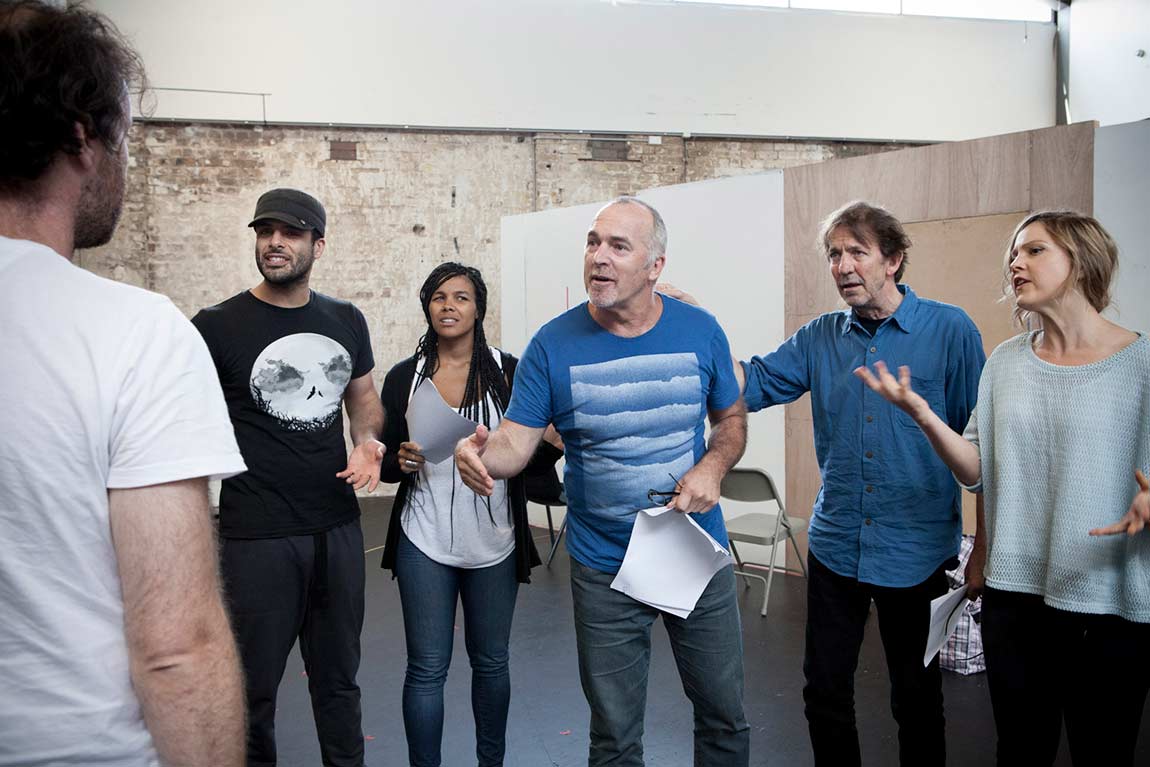Actors in Crisis: New Beginnings for The Government Inspector
Actor Gareth Davies talks panic, process and becoming mistaken auteur 'Seyfat Babayev'.
"The play's about a group of actors in crisis... so art is imitating life." Actor Gareth Davies is in the middle of a manic final week of rehearsals for The Government Inspector ahead of its opening at Melbourne's Malthouse, before a Sydney season at Belvoir.
"But manic's good," says Davies. "The plays I've done that have been bad have been slow, sedate, very careful and cautious things that we were all totally prepared for, and you get up there in front of an audience and it doesn't have a spark of spontaneity or panic."
In the plot of the original Russian play by Nikolai Gogol, a low-level clerk is confused with an important bureaucrat and worshipped as a god. In this collaboration between director Simon Stone, writer Emily Barclay and the cast, the gormless pen-pusher becomes a bitterly unsuccessful actor (Davies). A cast of frantic actors who are desperately putting together a show mistake him for a famous auteur and worship him accordingly.
Stone recently said that this play is "the furthest away I've ever gone [from a source text's foundations]". It's a big claim from a director who's built a career on adaptations that self-reportedly "rape and pillage" the classics. But Davies agrees that only the skeleton of the original work remains.
"There's various character archetypes and a basic story structure that's there, but the setting's entirely changed," he says. "Thematically it's pretty similar — it's fraud, it's someone accidentally being placed in a position where everyone thinks he's someone else and then kind of enjoying that. Once he's realised that he's essentially being totally dishonest with everyone he starts to really wallow, to enjoy the free booze and the free food and the way that people talk to him."
Like Gogol's story, Stone's choice of play was born out of misunderstanding: a sudden seismic shift prompted by the last-minute discovery of existing rights for Belvoir's scheduled production of The Philadelphia Story. I put it to Davies that the frustration of those events seems to have bled into this work, but he's more circumspect.
"It is a starting point for our play, but it would have been pretty uninteresting to do an attack on that situation. With these actors, at the beginning, just like us, something that they knew and something that they wanted is taken away and then the story begins, but that's as far as it goes — it's just a crisis that sets off the story."
As open as he is about its beginning, Davies is reluctant to give anything away about the latter parts of the play, especially the musical sections choreographed by Lucy Guerin and composed by longtime Stone collaborator Stefan Gregory.
For Davies, this kind of mainstage production seems a little out of character, given his background in independent theatre as one of the founders of The Black Lung Theatre and Whaling Firm, whose work has terrorised audiences across Australia. Yet Stone's process has in many ways reflected the same kind of approach. "The way we're working here is much more similar to those shows. Often with mainstage work as an actor you're one of the last people to find out about anything — by the time you arrive, the vision for the play is already there."
The world of The Government Inspector might be easy for the Malthouse and Belvoir to market to a theatre-savvy audience, familiar with the utter chaos that goes into creating a show, but Davies firmly believes in its wider appeal.
"We've been really aware of this, of making it too in-jokey," he says. "It is about a group of people making a show, but in the end that's not what you're responding to. More than anything else, it's a play about characters responding to crisis. In the end, we're all human, and just as petty, and beautiful, and small-minded as everyone else."






